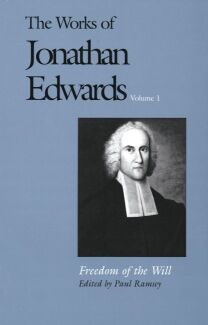 I purchased and read the new Yale paperback edition of Jonathan Edward's The Works of Jonathan Edwards, Vol. 1: Freedom of the Will. Normally, each volume of the Yale Edition of Edward's Works costs over $100! but recently three of the volume were released as paper back editions. So I snatched up Vol1 for only $20! What a deal. It includes great footnotes and a long preface for the book's background. The full text of On The Freedom Of The Will is available online for free at the Yale Edwards Center.
I purchased and read the new Yale paperback edition of Jonathan Edward's The Works of Jonathan Edwards, Vol. 1: Freedom of the Will. Normally, each volume of the Yale Edition of Edward's Works costs over $100! but recently three of the volume were released as paper back editions. So I snatched up Vol1 for only $20! What a deal. It includes great footnotes and a long preface for the book's background. The full text of On The Freedom Of The Will is available online for free at the Yale Edwards Center.
Freedom of the Will is Edward's magnum opus, but despite of its huge influence, it is still very readable. Edward's sermons are the most accessible, but of his longer works, this is the easiest to follow along with deductions. This book is not a string of bible verses, but a long philosophical argument, so I was surprised how few times he quoted the bible. Edward's purpose is to show that by plain reason, Free Will (or Arminianism) is not a tenable position.
The book begins by defining Free Will and consider what various Arminians and Calvinists mean when they say that they have free will. Then Edwards begins to challenge the concept of a Free Will. What is it that caused you to choose what you chose? Is free will something that's different than the desire to choose? If your free will is truly free, do you have any choice over what you will do next? Basically Edwards practically discusses how is it that we have come to choose what we actually choose.
Towards the end of the book, Edwards answers several tough questions. For instance, he suggests that God himself doesn't have a free will, and must always choose what is most perfect by his nature. He is all powerful, unlike man, but he is bound to only do what is most holy and righteous in the end. Evil is described by God withholding his holiness, in the same way as if the sun were to stop shining than darkness would occur due to the nature of the things shined upon which have no light of their own.
Edwards also points out that Arminians are so insistent on free will, but they do so because of the presupposition that God is not evil, and if there was no-free will, then God would be the doer of evil... but consequently that view requires that God has no ability to do evil, and therefore does not have free will. So the only person in the arminian view who has free will is man. Edwards also notes that some people object to God not having a free will, but just because something is disagreeable doesn't mean its wrong.
Edwards also notes that if there is Free Will, then the future is not knowable or fixed. If God merely knows all the possible outcomes, then he cannot say for certain which of the outcomes will happen, so therefore God is unable to make promises to us about what will happen to us in the future. And when God makes prophecies, they are merely speculation or conjecture that could be thwarted by someone's free will. So if you accept that God could be thwarted, then you make Jesus out to be a liar, because Jesus promised exact things would happen, even saying that not one iota of his word would pass away, even though the whole world will pass away. The repercussions are mind blowing!
Overall an excellent book. I highly recommend it to anyone who has questions about predestination and election.
Related: arminianism, calvinism, election, free will, Jonathan Edwards, on the freedom of the will, predestination



Leave a comment